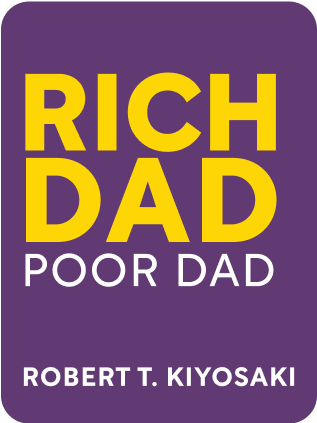

This article is an excerpt from the Shortform summary of "Rich Dad Poor Dad" by Robert T. Kiyosaki. Shortform has the world's best summaries of books you should be reading.
Like this article? Sign up for a free trial here .
What is personal financial literacy? How can it help you achieve your financial goals?
Anyone who wants to achieve certain financial goals should have a firm grasp on personal financial literacy. In order to learn personal financial literacy, you should first overcome your own mental obstacles, and then begin learning about the different strategies to create wealth like those outlined in Rich Dad, Poor Dad.
Learning Personal Financial Literacy From Rich Dad
Growing up in Hawaii in the 1950s, Robert Kiyosaki had two dads:
- Poor Dad: His biological dad, who was well educated (Stanford grad, PhD from Northwestern) but had the traditional mindset: work hard, get a stable job, and be financially conservative. The family did fine, but never made it to financial independence and left little to their kids.
- Rich Dad: His friend Mike’s dad, who didn’t graduate from high school and had his own financial ups and downs, but eventually built a local business empire and employed thousands. (believed to be Richard Kimi)
Robert Kiyosaki got conflicting advice from both dads on how to manage money, career, and financial risk. Ultimately he saw more wisdom and results in Rich Dad’s advice, and followed in the Rich Dad’s path, resulting in more financial knowledge.
While Robert Kiyosaki might really have had two dads, the more important point is that the two dads are a parable for two types of financial thinking.
- The Poor Dad represents the standard consensus view on work and money – go to school, get a good job and climb the ladder, prize stability over independence, buy a house, and spend money without a clear long-term plan.
- The traditional schooling system trains this style of thinking. (Plus, employers have the incentive to keep workers thinking this).
- Most parents belong to this system, so they pass it down to their kids.
- The Rich Dad represents what was then a more contrarian view – work for salary if you have to, but aim for financial independence; have your money generate more money; and take calculated risks boldly.
The traditional view worked better in the 20th century, when strong growth and decades-long employment meant stability was a viable strategy. Nowadays, pensions are rarely guaranteed; job security at a loyal employer is rare; professional education and academic success are no longer guarantees for security. Knowing these things give more opportunities to gain financial knowledge and make better decisions.
But the traditional thinking is still common. Rich Dad, Poor Dad aims to shake readers out of their current passive path and taking a proactive strategy to building wealth and working for their best interest. Figure out what to do with money once you earn it, learn how to keep people from taking it from you, and make the money work for you.
Rich Dad, Poor Dad explores differences between the two dads on a few levels:
- Mindset: how responsible each felt for personal financial literacy and proactively making good financial decisions
- Strategy: how they allocated their income among assets and liabilities, how they perceived risk
- Tactics: how they set up their income to lower taxes, what investments they make
The following tips can help you on your journey to achieving financial literacy.
1. Keep Learning All the Time
Developing financial intelligence pays off huge returns. If your mind is trained well, you can create enormous wealth in what in the grand scope of things is an instant.
In contrast, an untrained mind can also create poverty that lasts lifetimes.
Robert Kiyosaki believes financial intelligence is made up of four broad areas of expertise:
- Accounting: personal financial literacy. Read and understand financial statements.
- Investing: strategies to use money to make more money. The creative piece.
- Understanding markets: understand supply and demand. Can you create something that the market wants? Does an investment make sense under current market conditions?
- Law: use tax advantages and legal protection to build wealth more quickly and reduce risk.
Taken together, financial intelligence knowledge allows you to construct creative ways to solve financial problems, vet the ones that are more likely to work, then have the technical ability to execute them.
Consider that spending money on financial intelligence is like buying yourself life – you may save on years of working because of making the right decisions.
2. Get Over Feeling Guilt for Being Greedy
We’ve been raised to think of greed or desire as bad. “Stop thinking about yourself. Why don’t you think about others?” This is a hurdle you need to overcome to achieve personal financial literacy.
In reality, self-interest (generally, wanting to make your own life better) drives innovation and value for other people. This is the cornerstone of capitalism.
Condemning greed might be a trained defense, learned helplessness. “I don’t know how to become rich. So I’m just going to try to believe being rich is bad, and there’s valor in not wanting to be rich. Even though secretly I would love to be rich.” It’s easy to imagine parents feeling this, then teaching it to their kids.
3. There’s No Room for Arrogance in Personal Financial Literacy
“If you want to improve, be content to be thought foolish and stupid.” –Epictetus
Arrogance is ego plus ignorance.
When you’re ignorant in a subject, recognize this, then educate yourself.
Intelligent people welcome new ideas, since new ideas add synergy with other ideas.
Don’t be afraid of people smarter than you. Find out how to get them to work with you.
Don’t feel a trade is underneath you. Some people have an allergy to learning sales techniques, without realizing that much of the world runs on sales of some sort.
Personal financial literacy is an important part of achieving your financial goals. Without personal financial literacy, it can be very difficult to see your problems clearly and find appropriate solutions.

———End of Preview———
Like what you just read? Read the rest of the world's best summary of Robert T. Kiyosaki's "Rich Dad Poor Dad" at Shortform .
Here's what you'll find in our full Rich Dad Poor Dad summary :
- The key differences in how rich dad and poor dad approached life
- Why it's a terrible idea to buy an expensive house
- How to overcome your own mental blocks to become wealthy for life






